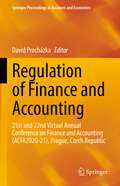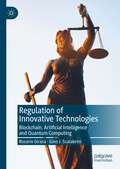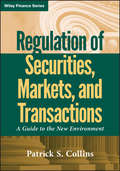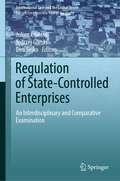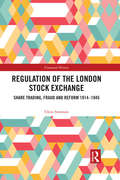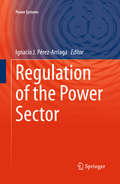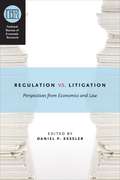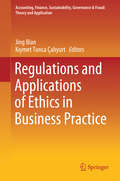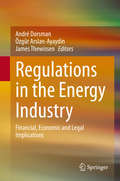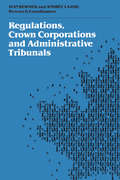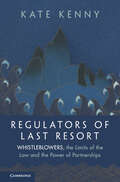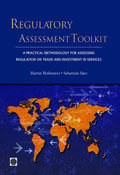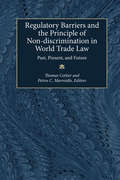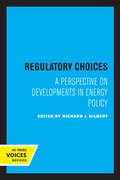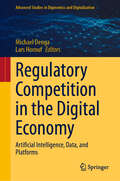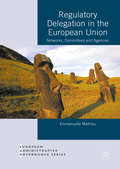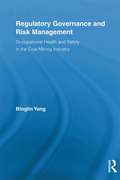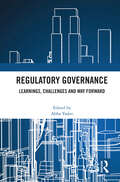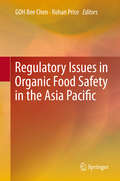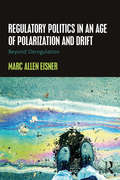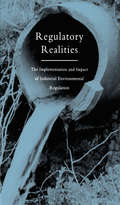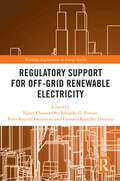- Table View
- List View
Regulation of Finance and Accounting: 21st and 22nd Virtual Annual Conference on Finance and Accounting (ACFA2020-21), Prague, Czech Republic (Springer Proceedings in Business and Economics)
by David ProcházkaThis edition provides a mix of research perspectives to examine the economic and non-economic outcomes of global developments in financial regulation, monetary and fiscal measures, or sustainable development, with a tailored focus on specifics in emerging and transitioning countries. The volume combines a mix of approaches to investigate relevant newly emerged topics (e.g., economics of emissions, corporate social responsibility reporting) as well as traditional issues requiring new approaches (e.g., exchange rate mechanisms, investment strategies, the impact of corporate reporting on economic fundamentals). Such a comprehensive view of contemporary economic phenomena makes the volume attractive not only to academia, but also to regulators and policymakers, when deliberating on the potential outcomes of competing regulatory mechanisms.
Regulation of Innovative Technologies: Blockchain, Artificial Intelligence and Quantum Computing
by Rosario Girasa Gino J. ScalabriniThis book explores the regulation of emerging technologies. Developments such as bitcoin (based on blockchain technology), artificial intelligence, quantum computing, and other technical advances have the potential to revolutionize many aspects of everyday life. As with other significant occurrences, especially when coupled by financial rewards, there are the inevitable attempts to reap gains unlawfully. This book examines the legal and regulatory enactments that attempt to undermine the risks to society as well as the dangers to individual freedoms that the technologies present when abused by governmental and non-governmental authorities. Included are discussions of the dangers to the right of privacy posed by facial recognition, physical location tracking, automated license plate recognition (ALPR) and other evolving applications of technology. This book is an invaluable resource for those interested in the regulation of emerging technologies particularly as they relate to blockchain, artificial intelligence, and the most current advances in quantum computing. Emphasis is focused on invasion of privacy, particularly by government authorities, antitrust implications of private companies and the efforts of international entities to counter alleged abuses by them.
Regulation of Securities, Markets, and Transactions
by Patrick S. CollinsThe ultimate guide to the current rules and regulations that govern the securities industry?including amendments in 2010Providing readers with expert coverage of domestic securities regulation, this book fills the need for coverage of securities regulations, defining, describing, and explaining everything professionals need to know about domestic securities regulation.Examines the current securities rulesProvides an overview of the latest regulations for this industryIncludes a description of the various government regulations of securities markets, and securities transactionsSince the corporate scandals of 2002, this industry has seen intense scrutiny of how it is regulated. Regulation of Securities, Markets, and Transactions demystifies the new laws and regulations with straightforward, to-the-point coverage professionals need.
Regulation of State-Controlled Enterprises: An Interdisciplinary and Comparative Examination (International Law and the Global South)
by Julien Chaisse Jędrzej Górski Dini SejkoThis book analyses actual and potential normative (whether legislative or contractual) conflicts and complex transnational disputes related to state-controlled enterprises (SCEs) operations and how they are interwoven with the problem of foreign direct investment. Moreover, SCEs also fall within the remit of international political economy, international economics and other SCE-related fields that go beyond purely legal or regulatory matters. In this connection, research on such economic and political determinants of SCE’s operations greatly informs and supplements the state of knowledge on how to best regulate cross-border aspects of SCE’s and is also be covered in this book. The book also aims to analyse the “SCE phenomenon” which includes a wide panoply of entities that have various structures with different degrees of control by states at the central or regional level, and that critically discuss the above-mentioned overlapping legal economic and political systems which can emerge under various shades of shadows casted by governmental umbrellas (i.e., the control can be exercised through ownership, right to appoint the management, and special-voting-rights). The chapters in this book are grouped, so as to address cross-border investment by and in SCE, into four coherent major parts, namely --- (i) the regulatory framework of state capitalism: laws, treaties, and contracts; (ii) economic and institutional expansion of state capitalism; (iii) the accountability of state capitalism: exploring the forms of liabilities; and (iv) regional and country perspectives. Contributions address the core theme from a broad range of SCE and international economic regulations, including but not limited to competition law, WTO law, investment law, and financial/monetary law. They also cover the new emerging generation of Free Trade Agreements (EU-Vietnam FTA, EU China investment treaty, Regional Comprehensive Economic Partnership; and the coordination between treaty systems). The book is a valuable addition and companion for courses, such as international trade law, international law of foreign investment, transnational law, international and economic development, world politics, law of preferential trade agreements, international economics, and economics of development.
Regulation of the London Stock Exchange: Share Trading, Fraud and Reform 1914–1945 (Financial History #29)
by Chris SwinsonIn 1914, the notion of statutory regulation of trading in shares was anathema to both the Government and the London Stock Exchange. By 1945, a statutory scheme of regulation had been introduced. This book serves to: Track the steps by which this outcome came about, Explain why the Exchange felt obliged in the process to abandon long-cherished policies, Analyse the forces which led to it, and Account for the form in which it was implemented. Throughout the period, the attitudes of both the Stock Exchange and Government were affected by widening interest in share ownership, the increasing tendency for business interests to look to the Exchange for long-term finance, and the increasing challenge of financing the Government’s expenditure. At a disaggregated level, the market was able to respond to changing circumstances taking advantages of opportunities and weaknesses. At an aggregated level, the Exchange was not able to foresee the implications of change or to forestall unfortunate consequences. This exposed the weakness of the criminal justice system and its failure to serve as a deterrent for abuse. This study, the only book to take full account of the documents held by the National Archives in relation to the Bodkin Committee, examines the stages by which share trading in the United Kingdom came to be a statutorily regulated activity and by which the London Stock Exchange moved from being antagonistic towards public regulation in 1914 to lobbying in 1944 for the new scheme to be implemented.
Regulation of the Power Sector
by Ignacio J. Pérez-ArriagaRegulation of the Power Sector is a unified, consistent and comprehensive treatment of the theories and practicalities of regulation in modern power-supply systems. The need for generation to occur at the time of use occasioned by the impracticality of large-scale electricity storage coupled with constant and often unpredictable changes in demand make electricity-supply systems large, dynamic and complex and their regulation a daunting task. Arranged in four parts, this book addresses both traditional regulatory frameworks and also liberalized and re-regulated environments. First, an introduction gives a full characterization of power supply including engineering, economic and regulatory viewpoints. The second part presents the fundamentals of regulation and the third looks at the regulation of particular components of the power sector in detail. Advanced topics and subjects still open or subject to dispute form the content of Part IV. In a sector where regulatory design is the key driver of both the industry efficiency and the returns on investment, Regulation of the Power Sector is directed at regulators, policy decision makers, business managers and researchers. It is a pragmatic text, well-tested by the authors' quarter-century of experience of power systems from around the world. Power system professionals and students at all levels will derive much benefit from the authors' wealth of blended theory and real-world-derived know-how.
Regulation vs. Litigation: Perspectives from Economics and Law (National Bureau of Economic Research Conference Report)
by Daniel P. KesslerThe efficacy of various political institutions is the subject of intense debate between proponents of broad legislative standards enforced through litigation and those who prefer regulation by administrative agencies. This book explores the trade-offs between litigation and regulation, the circumstances in which one approach may outperform the other, and the principles that affect the choice between addressing particular economic activities with one system or the other. Combining theoretical analysis with empirical investigation in a range of industries, including public health, financial markets, medical care, and workplace safety, Regulation versus Litigation sheds light on the costs and benefits of two important instruments of economic policy.
Regulations and Applications of Ethics in Business Practice (Accounting, Finance, Sustainability, Governance & Fraud: Theory and Application)
by Kıymet Tunca Çalıyurt Jing BianThis book presents a variety of discussions from different countries about regulations and applications of ethics in business practice. It demonstrates how Ethics, both in the world of business and in academic life, is consistently a central and unavoidable issue that institutions must devise new regulations on a regular basis to address. Given that applying such regulations becomes complicated in a global business landscape and that International companies have lost large amounts of revenues due to fraudulent activities, the book provides insights for professionals in business world to teach, learn, apply, measure and report on companies' daily business. Business and Professional Ethics: Theories, Standards, and Analysis is essential reading for researchers and students in business schools around the world.
Regulations and International Trade
by Kaoru Nabeshima Etsuyo Michida John HumphreyThis book evaluates the evolution of regulatory policy in advanced countries and discusses how, due to globalization, policy changes in one country have a knock-on effect in others. Separated in two parts, the first half focuses on policy in developed countries and regulatory diffusion from Europe to Asia. The second part looks at the business impact of policy developments in a number of Southeast Asian countries. Key chapters discuss Thailand's response to EU chemical regulations, the diffusion of private food standards, and the effect of chemical safety standards in Malaysia and Vietnam. These contributions are written by leading scholars in the field and the book is likely to be of interest to students, researchers and policy makers concerned with regulation changes in East Asia.
Regulations in the Energy Industry: Financial, Economic and Legal Implications
by André Dorsman Özgür Arslan-Ayaydin James ThewissenThis book provides a broad overview of the financial, economic and legal implications of energy industry regulations in various countries. In light of significant changes around the globe, it analyses various institutions that are involved in regulative measures, and based on various country studies, it offers insights into how energy sector regulations differ across countries with different market structures and institutions. Covering major topics such as laws and regulations geared to market competition and sustainability and the impact of noncompliance to regulations, from the perspectives of financial markets, and financial risks, the book is divided into four parts: Part I Regulations: price and trade controls; Part II. Non-price & trade control regulations; Part III: Compliance with regulations; and Part IV: Market issues and regulation. It will appeal to scholar in economics, finance and related fields as well as to policymakers and practitioners in the energy industry. This is the seventh volume in a series on energy organized by the Centre for Energy and Value Issues (CEVI). The previous volumes in the series were: Financial Aspects in Energy (2011), Energy Economics and Financial Markets (2012), Perspectives on Energy Risk (2014), Energy Technology and Valuation Issues (2015), Energy and Finance (2016) and Energy Economy, Finance and Geostrategy (2018).
Regulations, Crown Corporations and Adminstrative Tribunals: Royal Commission
by Ivan Bernier Andrée LajoieThis is the third of six volumes dealing with Law, Society and the Economy (see list in back of book), included in the Collected Research Studies of the Royal Commission on the Economic Union and Development Prospects for Canada.This volume surveys administrative law in its various manifestations and considers new themes and issues that are likely to affect the subject. Challenging generally accepted views, the contributors discuss such topics as the structures and processes of Canadian administrative tribunals, Crown corporations as an instrument of economic intervention, and the use of delegated legislation as the preferred instrument of government regulations.
Regulators of Last Resort: Whistleblowers, the Limits of the Law and the Power of Partnerships
by Kate KennyHow do public whistleblowers prevail despite employers' attempts to silence them? Whistleblowing is essential for raising awareness of extreme wrongdoing within organizations yet, despite changing laws designed to offer more protection, workers exposed for public disclosures frequently find themselves the targets of extreme retaliation. Featuring high-profile cases from Amazon, Facebook and Theranos, Kate Kenny reveals the critical - and often unseen - role that skilled allies play in supporting whistleblowers when official channels fail. Novel and sophisticated means of silencing require new strategies for whistleblowing – and supportive partners are key. In this new era of whistleblowing, oppressive lawfare is used against truth-telling workers, and official channels can be weaponized. Yet powerful employers can still make mistakes. Regulators of Last Resort shows how aggressive reprisals can yield surprising advantages for dissenters. Working in partnership with advocates, public whistleblowers can find strategies to survive, persist and bring their disclosures to light.
Regulatory Assessment Toolkit
by Sebastián Sáez Martín MolinuevoThe services sector--ranging from telecommunications and banking to business processing and outsourcing--is increasingly recognized as part and parcel of any trade strategy, both as a source of export diversification in its own right as well as a key component of a country's competitiveness. Unlike trade in goods, which is governed by border measures that regulate the entry of foreign merchandise, international trade in services is subject to a wide range of domestic laws and regulations that govern access and operations by both domestic and foreign suppliers. While such regulations are essential where market failures or externalities exist and to ensure non-economic objectives, it is often difficult to differentiate between legitimate policy objectives and protectionist measures that introduce distortions and inefficiency in the market. An unnecessarily restrictive regulatory framework limits the potential of the services sector to develop, and undermines the export opportunities and competitiveness of domestic businesses. This toolkit offers a practical methodology to assess the impact of services regulations: the Regulatory Assessment on Services Trade and Investment (RASTI). The RASTI helps to evaluate whether a country's regulatory framework is promoting the development of an efficient domestic services market, and offers guidance on how to ensure that services regulation correctly addresses market failures and achieves public policy goals. The authors propose three steps towards a trade-related regulatory assessment: - mapping laws and regulations that affect trade and investment in services, and assessing the regulatory process and institutional arrangements; - wherever possible, providing a quantitative assessment of the impact of regulations on performance and market structure, including prices, quality and access; and - identifying alternative regulations and institutional set-ups that promote an enabling regulatory environment for services trade while achieving the desired policy goals. Performing a regulatory assessment can serve multiple purposes depending on the circumstances and the needs of the evaluators, including bridging information gaps; supporting regulatory reform; supporting trade negotiations; assessing regulatory performance; and promoting better regulatory practices. The Regulatory Assessment Toolkit will be of particular interest to policy makers and government officials from regulatory bodies, experts at development banks and donor agencies, and academics and researchers in the field of economic regulation.
Regulatory Barriers and the Principle of Non-Discrimination in World Trade Law
by Thomas Cottier Petros C. MavroidisThe University of Michigan Press is pleased to announce the second volume in an annual series, the World Trade Forum. The Forum's members include scholars, lawyers, and government and business practitioners working in the area of international trade, law, and policy. They meet annually to discuss integration issues in international economic relations, focusing on a new theme each year. The World Trade Forum 1998 deals with the issue of regulatory barriers. Contributors focus their attention on the implications that government intervention has on the principle of nondiscrimination, the cornerstone of the World Trade Organization. The chapters, which cover both the positive and the normative level, deal in particular with the issue of "like product" definition, and with mutual recognition agreements. The relevant WTO case law is presented and analyzed, and the roundtable discussions are primarily aimed at clarifying to what extent a constitutional function should be assigned to the WTO organs, if at all. Contributors include: Christoph Bail, Jacques Bourgeois, Marco Bronckers, Thomas Cottier, William Davey, Paul Demaret, Piet Eeckhout, Crawford Falconer, Olivier Guillod, Meinhard Hilf, Gary Horlick, Robert Howse, Robert Hudec, Patrick Low, Aaditya Mattoo, Petros C. Mavroidis, Patrick Messerlin, Damien Neven, Kalypso Nicolaidis, David Palmeter, Ernst Ulrich Petresmann, Andre Sapir, and Michel Waelbroeck. Thomas Cottier is Professor of Law, Institute of European and International Economic Law, University of Bern Law School. Petros C. Mavroidis is Professor of Law, University of Neuchâtel.
Regulatory Choices: A Perspective on Developments in Energy Policy
by Richard J. GilbertRegulatory Choices offers the first comprehensive economic history of energy policy and its consequences for California, where some of the most innovative and far-ranging programs of regulatory reform have originated. The authors of this volume have gathered together an impressive wealth of material about actual policy decisions and their repercussions and have subjected their findings to astute economic analysis. This book will serve for years to come as an invaluable reference on the costs and effects of various energy policies. With its focus on bringing prices in alignment with the true cost of producing power and delivering it to the customer, the first part of the book outlines the issue of setting utility rates and considers some of the proposals to provide regulated industries with incentives to respond to economic and environmental concerns. The problems of energy supply occupy the second part of the book, which includes a survey of the costs of alternative energy sources and estimates of their environmental impacts, as well as a case study of the construction of the Diablo Canyon nuclear power plant. The book concludes by documenting the results of subsidy programs that were designed to target the development of wind power and residential energy conservation. Regulators, we learn, have a mixed record when it comes to managing the production of energy. Some conservation programs have enjoyed considerable economic success, particularly those that correct a lack of consumer information. Others, such as the renewable energy tax credits or programs designed to subsidize new technologies, have cost much more than the value of the energy they have saved. What emerges clearly from this study is that regulated industries are not immune from the forces of competition. This title is part of UC Press's Voices Revived program, which commemorates University of California Press’s mission to seek out and cultivate the brightest minds and give them voice, reach, and impact. Drawing on a backlist dating to 1893, Voices Revived makes high-quality, peer-reviewed scholarship accessible once again using print-on-demand technology. This title was originally published in 1991.
Regulatory Competition in the Digital Economy: Artificial Intelligence, Data, and Platforms (Advanced Studies in Diginomics and Digitalization)
by Lars Hornuf Michael DengaThe digital economy is reinvigorating regulatory competition, yet little is known about which rules and jurisdictions can effectively bind companies nor what competitive motivations underlie certain rules. In addition to purely economic motives, legislators are now also driving the pursuit of digital sovereignty and the enforcement of social values in digital spaces. It also remains unclear what regulatory weight the self-regulation of private companies has in multi-level governance systems. This book examines regulatory competition in the three main pillars of digital markets: artificial intelligence, data, and platforms. It brings together legal scholars, economists and information systems experts, providing relevant examples and structured analysis of the aims and outcomes of regulatory competition in the digital economy. “A timely exploration of the balancing acts regulators must perform to manage private power in a globalized digital economy. Essential for understanding the intersection of law, economics, and technology in the contemporary digital ecosystem.” Jens Frankenreiter, Associate Professor of Law, Washington University “The book by Denga and Hornuf provides a comprehensive and timely exploration of the intricate regulatory challenges posed by big data, artificial intelligence, and platforms in the Digital Single Market. If offers critical insights for policymakers, scholars, and businesses navigating this evolving landscape.” Philipp Hacker, Professor for Law and Ethics of the Digital Society, European University Viadrin “Artificial Intelligence is fundamentally disrupting how we enable economic growth and how we regulate fair competition. Luckily, Denga and Hornuf provide a detailed and comprehensive overview of the thorniest and most complex regulatory issues while at the same time offering thoughtful and feasible solutions. "Regulatory Competition in the Digital Economy" is a treasure trove for anyone interested in market regulation, fair competition, consumer protection, and geopolitical questions.” Sandra Wachter, Professor of Technology and Regulation, Oxford Internet Institute
Regulatory Delegation in the European Union
by Emmanuelle MathieuThis book addresses the regulatory capacity of the EU as it responds to the huge challenge of realizing the single market. It explores its weaknesses, the EU regulatory networks, expert committees and EU agencies formed in response, and the exceptionally large and complex transnational regulatory system which has resulted. It defines the EU regulatory space as a multi-faceted phenomenon of institutional expansion whose shape varies across sectors and changes over time. Empirically based on the exploration of how regulatory delegation has emerged and evolved in three key EU policies (food safety, electricity, and telecommunications), the book disentangles and links together the functional, institutional and power-distributional factors and their interplay over time into a unified explanation of the many faces of the EU regulatory space.
Regulatory Frameworks for Hawala and Other Remittance Systems
by International Monetary FundA report from the International Monetary Fund.
Regulatory Governance and Risk Management: Occupational Health and Safety in the Coal Mining Industry (Routledge Advances in Management and Business Studies)
by Binglin YangRegulatory Governance and Risk Management will be the first book addressing the diffusion of risk-based governance in the coal mining industry from a health and safety standpoint. More specifically, it aims to understand a puzzling phenomenon. Since the 1990s, the approach of risk-based governance has been widely adopted in almost all developed countries in Europe and commonwealth countries. It, however, has diffused much more slowly in the U.S. Using a diffusion approach and comparisons between Australia and the U.S., this book examines mechanisms that both drive and prevent the diffusion of risk-based governance in the coal mining industry. This book has two major selling points. First, this is a timely work given the Upper Big Branch coal mine explosion occurred in April, 2010. After this disaster, many asked why an enhanced level of enforcement after 2006 has not prevented catastrophic accidents from occurring and why risk-based governance, which helps other countries achieve better safety performance, has been largely ignored in the U.S. This book answers these questions and makes recommendations on how to remove barriers in moving toward risk-based governance. Second, this book is readable because it embeds theories into storytelling and gives particular emphasis on the influence of key strategic individuals.
Regulatory Governance: Learnings, Challenges and Way Forward
by Abha YadavThis book explores the role of regulatory bodies and their emergence as the fourth branch of governments. It brings together professionals, academicians, and experts working in regulatory sector to present a foundational text on regulatory regime in India. From case studies to theoretical interventions, the book brings together a wide range of insights on an important but often neglected aspect of governance. It examines a range of themes including, the need for regulatory policy in a post-Covid world, regulatory excellence, impact of regulatory assessments, regulation of hazard, competition commissions, regulation of digital assets, stakeholder interests and investor activism, and anti-trust laws.The volume will be of great interest to scholars and researchers of law and governance, public policy and South Asian studies.
Regulatory Hacking: A Playbook for Startups
by Evan Burfield J. D. HarrisonEvery startup wants to change the world. But the ones who truly make an impact know something the others don't: how to make government and regulation work for them.As startups use technology to shape the way we live, work, and learn, they're taking on challenges in sectors like healthcare, infrastructure, and education, where failure is far more consequential than a humorous chat with Siri or the wrong package on your doorstep. These startups inevitably have to face governments responsible for protecting citizens through regulation. Love it or hate it, we're entering the next era of the digital revolution: the Regulatory Era.The big winners in this era--in terms of both impact and financial return--will need skills they won't teach you in business school or most startup incubators: how to scale a business in an industry deeply intertwined with government.Here, for the first time, is the playbook on how to win the regulatory era. "Regulatory hacking" doesn't mean "cutting through red tape"; it's really about finding a creative, strategic approach to navigating complex markets.Evan Burfield is the cofounder of 1776, a Washington, DC-based venture capital firm and incubator specializing in regulated industries. Burfield has coached startups on how to understand, adapt to, and influence government regulation. Now, in Regulatory Hacking, he draws on that expertise and real startup success stories to show you how to do the same. For instance, you'll learn how... * AirBnB rallied a grassroots movement to vote No on San Francisco's Prop F, which would have restricted its business in the city. * HopSkipDrive overcame safety concerns about its kids' ridesharing service by working with state government to build trust into its platform. * 23andMe survived the FDA's order to stop selling its genetic testing kits by building trusted relationships with scientists who could influence the federal regulatory community.Through fascinating case studies and interviews with startup founders, Burfield shows you how to build a compelling narrative for your startup, use it to build a grassroots movement to impact regulation, and develop influence to overcome entrenched relationships between incumbents and governments. These are just some of the tools in the book that you'll need to win the next frontier of innovation.
Regulatory Issues in Organic Food Safety in the Asia Pacific
by Goh Bee Chen Rohan PriceThe book seeks to address the intersection of food organics and the emergence of a new contractualism between producers, distributors and consumers, and between nation states. Additionally, it seeks to cater to the needs of a discerning public concerned about how its own country aims to meet their demands for organic food quality and safety, as well as how they will benefit from integration in the standard-setting processes increasingly occurring regionally and internationally. This edited volume brings together expert scholars and practitioners and draws on their respective insights and experiences in the field of organics, food and health safety. The book is organized in three parts. Part I outlines certain international perspectives; Part II reflects upon relevant histories and influences and finally, Part III examines the organic food regulatory regime of various jurisdictions in the Asia Pacific.
Regulatory Politics in an Age of Polarization and Drift: Beyond Deregulation
by Marc Allen EisnerRegulatory change is typically understood as a response to significant crises like the Great Depression, or salient events that focus public attention, like Earth Day 1970. Without discounting the importance of these kinds of events, change often assumes more gradual and less visible forms. But how do we ‘see’ change, and what institutions and processes are behind it? In this book, author Marc Eisner brings these questions to bear on the analysis of regulatory change, walking the reader through a clear-eyed and careful examination of: the dynamics of regulatory change since the 1970s social regulation and institutional design forms of gradual change – including conversion, layering, and drift gridlock, polarization, and the privatization of regulation financial collapse and the anatomy of regulatory failure Demonstrating that transparency and accountability – the hallmarks of public regulation – are increasingly absent, and that deregulation was but one factor in our most recent significant financial collapse, the Great Recession, this book urges readers to look beyond deregulation and consider the broader political implications for our current system of voluntary participation in regulatory programs and the proliferation of public-private partnerships. This book provides an accessible introduction to the complex topic of regulatory politics, ideal for upper-level and graduate courses on regulation, government and business, bureaucratic politics, and public policy.
Regulatory Realities: The Implementation and Impact of Industrial Environmental Regulation
by Joseph Murphy Andrew GouldsonArguing that the performance of industrial environmental regulation is determined by the level and nature of the innovation it stimulates, this text aims to analyze the influence of different structures and styles of implementation on innovation in regulated companies. Further aims include: examining the economic and environmental performance of different forms of innovation developed and applied by industry in response to regulation; describing the conditions under which industrial environmental regulation can be improved; outlining the implementation approaches required for regulated companies to overcome barriers which prevent them from exploiting the economic and environmental potential of particular forms of innovation; demonstrating how technological and organizational change could lead to lower costs and higher benefits from regulatory compliance; and putting forward to governments and industry proposals to improve the relationship between environmental protection and industrial competitiveness.
Regulatory Support for Off-Grid Renewable Electricity (Routledge Explorations in Energy Studies)
by Ngozi Chinwa Ole, Eduardo G. Pereira, Peter Kayode Oniemola, and Gustavo Kaercher LoureiroThis book investigates the role of law in enabling and addressing the barriers to the development of off-grid renewable electricity (OGRE). The limited development of OGRE is ascribed to a host of social, economic, and legal barriers, including the problem of initial capital costs, existing subsidies for conventional electricity, and lack of technological and institutional capacity. Through the analyses of selected case studies from Africa, Asia, Europe and North and South America, this book discusses the typical barriers to the development of OGRE from a global perspective and examines the role of the law in addressing them. Drawing together the lessons learnt from the case studies, this book offers robust recommendations on how the development of OGRE will support the goal of achieving universal access to low carbon, reliable, and sustainable electricity globally. This volume will be of great interest to students, scholars, policy makers, investors, and practitioners in the fields of energy law and policy, climate change, and renewable energy development.
